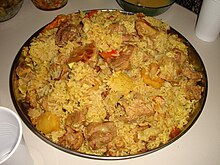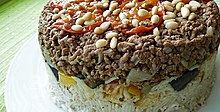Maqluba
 | |
| Alternative names | Maaluba, magluba, maqlouba, Maqlooba |
|---|---|
| Course | Meal |
| Place of origin | Levant |
| Region or state | Middle East |
| Serving temperature | Hot |
| Main ingredients | Meat, rice, and vegetables (tomato, cauliflower, potato, eggplant) |
Maqluba or Maqlooba (Arabic: مقلوبة) is a traditional Iraqi,[1] Lebanese,[2][3] Palestinian,[4][5][6][7] Jordanian,[8][9] and Syrian[10][3] dish served throughout the Levant. It consists of meat, rice, and fried vegetables placed in a pot which is flipped upside down when served, hence the name maqluba, [11] which translates literally as "upside-down." The dish goes back centuries and is found in the Kitab al-Tabikh, a collection of 13th century recipes.[12]

Ingredients
Maqluba can include a variety of vegetables, such as fried tomatoes, potatoes, cauliflower, and eggplant, accompanied by either chicken or lamb.[13] The most common are cauliflower and eggplant. All the ingredients are carefully placed in the pot in layers, so that when the pot is inverted for serving, the dish looks like a layer cake.[11][4]
Maqluba is typically garnished with pine nuts and chopped fresh parsley.[14] It sometimes served with salad and fresh yogurt, and is often prepared for feasts and large gatherings.
Since the unsuccessful coup attempt in Turkey, in 2016, the dish is seen as a "Gulenist delicacy". It is assessed as strong evidence of membership of the Gülen movement.[15]
See also
- Arab cuisine
- Egyptian cuisine
- Israeli cuisine
- Jordanian cuisine
- List of casserole dishes
- Macaroni Hamin
- Palestinian cuisine
References
- ^ Bidoun. "Cooking with Maha Alusi". Bidoun. Retrieved 2019-01-04.
- ^ Shaheen. "Maqluba--The Paella of Palestine". Arab America. Retrieved 2020-07-20.
- ^ a b Behnke, Alison (2005). Cooking the Middle Eastern way. Ehramjian, Vartkes. Minneapolis: Lerner Publications Co. p. 50. ISBN 0-8225-3288-3. OCLC 59008909.
{{cite book}}: CS1 maint: date and year (link) - ^ a b Linda Gradstein (6 December 2015). "Eucalyptus offers food from the Bible". Jerusalem Post. Retrieved 12 November 2018.
- ^ Timothy L. Gall; Jeneen Hobby (2009). Worldmark Encyclopedia of Cultures and Daily Life. Gale. p. 782. ISBN 978-1-4144-4892-3.
The most traditional Palestinian meals are maqluba, musakhan, and mansaf
- ^ Ottolenghi, Yotam (2015). "Jerusalem on a Plate". Gastronomica: The Journal of Critical Food Studies. 15 (1). University of California Press: 3. doi:10.1525/gfc.2015.15.1.1. ISSN 1529-3262.
Maqluba, an upside-down rice and vegetable cake that is actually Palestinian
- ^ Elizabeth Carty (24 September 2012). Shrewd Food: A New Way of Shopping, Cooking and Eating. ISBN 9781444725780.
- ^ Swift, Robert (2016-03-07). "Maqluba - Eating Upside Down". The Media Line. Retrieved 2018-12-11.
- ^ Benayoun, Mike. "Jordan: Makluba (Maqluba)". 196 Flavors.
- ^ Joubin, Rebecca (2013). The politics of love : sexuality, gender, and marriage in Syrian television drama (“...recipe for the well-known Syrian rice dish “maqluba” (upside down)...”). Lanham: Lexington Books. p. 101. ISBN 978-0-7391-8429-5. OCLC 852830015.
- ^ a b Lam, Francis (5 January 2017). "A Middle Eastern Layer Cake for Dinner". Retrieved 13 November 2018.
- ^ Smith, Jen Rose (2018-01-02). "Beyond hummus: 10 foods you must try in Jordan". CNN Travel. Retrieved 2019-01-02.
- ^ "Cooks.com - Recipe - Maqluba (Cauliflower with rice)".
- ^ "Maqlooba (Maqluba), Palestinian Upside Down Rice Recipe". LinsFood | by Azlin Bloor. 2013-07-21. Retrieved 2018-12-04.
- ^ Gauthier-Villars, David (2018-04-17). "U.S. Pastor Held in Turkey Denies Links to Terrorists". Wall Street Journal. ISSN 0099-9660. Retrieved 2020-12-17.
